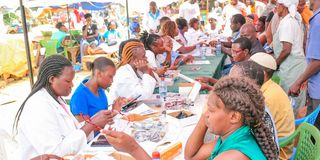Emphasise health education and disease prevention

Some of the traders at Kisumu's Kibuye market who turned up for the free health screening.
Since Independence, when the government promised to fight ignorance, disease and poverty, health has been on the radar of successive governments.
We have made huge strides in curative health services but that is not enough. A healthy nation is one that includes all aspects of what health actually is.
Health education is essential if people are to learn to live healthily and avoid diseases. Health education helps people to care about their own health and take part in organising health services and disease control programmes. It is the route to making people realise that health and healthcare services are basic human rights for mankind.
Community health workers should link health services to development. In primary prevention, which is the beginning of healthy living, education enables people to value good health and know about diseases and how to make use of organised health services.
The Maternal and Child Health Clinics (MCH) success has been through vigorous education and awareness creation. The road to health begins at the grass root.
Proper information motivates people to practise personal hygiene and healthy habits like using safe water, proper sanitation and proper waste management. Through health education, medical workers can easily understand what people want.
There will be proper communication to develop healthier lives. That will help the country to gain ground in health service delivery, especially in rural areas, enabling people to understand preventive health services.
They will value the different screening procedures. When citizens are well informed, they are able to recognise the symptoms and signs of important diseases that affect them daily.
Health education, when properly carried out, becomes a two-way process. It is not just medical staff telling people what to do. The people will help the medics to understand their situation, needs and demands. Culture and the environment are vital in boosting health services. Good communication will create rapport with the audience.
David M. Kigo, Nairobi





